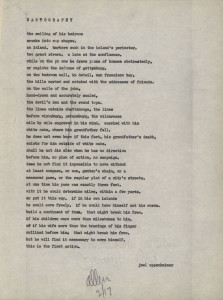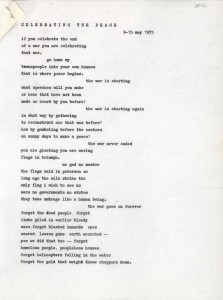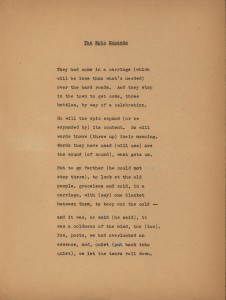In his third blog installment, Glastonbury teacher and writer David Polochanin, recipient of the James Marshall Fellowship, shares two of his original poems after reading poetry in the Dodd Collection, from the Joel Oppenheimer and Robert Creeley papers.
Blog post 3: On Poetry
“Cartography” and “Celebrating the Peace” by Joel Oppenheimer (Joel Oppenheimer Papers, Box 11, Archives & Special Collections, University of Connecticut Libraries). All rights reserved. No unauthorized reproduction allowed by any means for any reason.
3.20.13
Who would have
thought that
these papers,
with their typewriter
ink fading,
would see the
light of day
again, let alone
on this windy
Wednesday morning
in March?
When the poet
fashioned these words
40 years ago
they were
nothing special,
drafts scattered
in the author’s mind,
printed in a cluttered office,
gathering on the shelf
and the desk top,
in piles on the floor
against the wall,
and others in a stack
on the sill
beside a cactus.
The plant
(and the author)
have long since died
but today
I open a manila
folder and the poetry
comes alive, quite
a miracle, actually.
His words of reflection
and longing, poems
commemorating seasons,
and scenes
in New York City
that the poet likely
saw each day, planes
rising above the
Financial District,
papers blowing
on the sidewalk,
a bird that spent half
its morning jumping
from branch to branch
in a single tree
as a stream of taxis
formed one line
from here
to Central Park,
all of them turning at once,
then disappearing on
behind a monument
when I close this folder
and open the next.
“The Epic Expands” by Robert Creeley (Robert Creeley Papers, Box 2:Folder 48, Archives & Special Collections, University of Connecticut Libraries). All rights reserved. No unauthorized reproduction allowed by any means for any reason.
Sipping A Coke
Back when I was a kid
we used to sit on a porch
and sip Coke.
The parents sat in
rocking chairs,
holding their drink
in a bottle;
the young ones sat
on the concrete steps
flicking with their non-
drinking hand
the tiniest of pebbles
and the sun sat
motionless
in the sky.
We sipped it together.
We sipped it because
it was good. People
didn’t die because
of soft drinks, then.
No one developed
an addiction to caffeine
and diabetes
wasn’t a problem.
Having this drink allowed
us to chat about life,
about the dog’s laziness,
how the garden
was coming along,
and there was
a baseball game
on the radio
Saturday night.
Yes, those afternoons
had some kind
of timeless element.
I can still taste
the sweet soda
in my mouth
and I wonder
to this day
as I read this poem
what that
is all
about.



